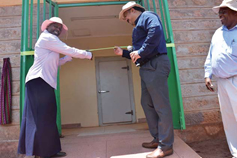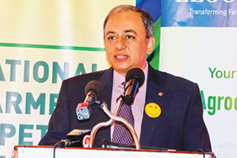CIMMYT Shows Partners in Kenya New Breakthroughs in Maize and Wheat Research

On the first day, CIMMYT invited IMIC researchers to evaluate Material Under Development at the Kiboko site. These maize lines are not publicly released yet but are available to IMIC partners, so they can select the most promising ones for their research and crop improvement work. Each seed company was looking for certain traits to develop new hybrid varieties. For instance, Samit Fayek, from Fine Seeds Egypt was looking for ‘erect type’ maize, as he wants higher crop density and grains that look big. Christopher Volbrecht, from Lake Agriculture in South Africa, was looking for “cobs that stick out as this is what farmers want.” Josephine Okot, from Victoria Seeds in Uganda, said that “seed companies often look at drought tolerance only, but we need now to integrate resistance to Maize Lethal Necrosis.”
Next on the tour to Kiboko, partners visited various stress-tolerant breeding materials, sustainable intensification cropping demonstrations and the Doubled Haploid facility. Vijaya Chaikam, Maize Doubled Haploid Scientist, explained how CIMMYT uses this methodology to cut down breeding time from six to two cycles, which drastically reduces costs.
 Water is life. So we hear. But nowhere has this been aptly captured than in feeding a burgeoning world population. Globally there is an estimated 842 million hungry people meaning one in eight people in the world suffer from chronic hunger.
Water is life. So we hear. But nowhere has this been aptly captured than in feeding a burgeoning world population. Globally there is an estimated 842 million hungry people meaning one in eight people in the world suffer from chronic hunger. Hunger is a violation of human dignity and an obstacle to social, political and economic progress. Yet millions of people in Kenya are prevented from realising the fundamental human right to be free from hunger because of government corruption and abuse of power.
Hunger is a violation of human dignity and an obstacle to social, political and economic progress. Yet millions of people in Kenya are prevented from realising the fundamental human right to be free from hunger because of government corruption and abuse of power. Experts say the government has not allocated enough resources for the 2018/2019 of food security and nutrition. New report released yesterday on the 2018/2019 budget analysis stated that Kenya’s quest to become food secure will remain a mirage unless urgent and deliberate reformed are implemented. This is despite the agriculture sector receiving sh.1.45 billion more this financial year compared to the last budget.
Experts say the government has not allocated enough resources for the 2018/2019 of food security and nutrition. New report released yesterday on the 2018/2019 budget analysis stated that Kenya’s quest to become food secure will remain a mirage unless urgent and deliberate reformed are implemented. This is despite the agriculture sector receiving sh.1.45 billion more this financial year compared to the last budget.